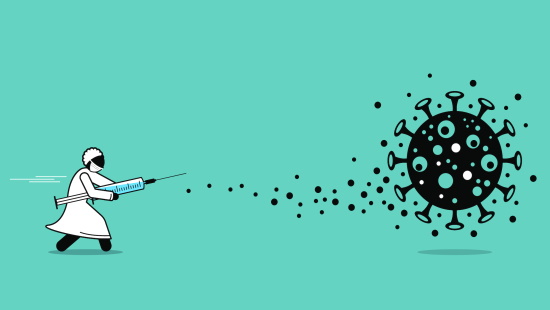Understanding the COVID Vaccine and mRNA

The COVID-19 vaccines from Pfizer-BioNTech and Moderna are messenger RNA (mRNA) vaccines, which prompt our cells to make a protein that triggers an immune response inside our bodies.
The use of mRNA technology, which creates immunity differently than traditional vaccines, is a key reason COVID-19 vaccine testing and development was done in under a year.
Still deciding about the vaccine or know someone who is? See these reasons to get the vaccine.
How Vaccines Work
When a person is infected with a germ, whether a virus or bacteria, the immune system creates special proteins, called antibodies, that help protect against future infections from that germ. The next time your immune system sees that germ, it "remembers" and uses the antibodies to fight against the infection. Some antibodies only last a few months, while others can protect you for a lifetime.
Vaccines create antibodies that allow your body to protect itself from future infections without actually getting sick.
Previously developed vaccines contain very small amounts of viruses or bacteria that are dead or greatly weakened. They trick the immune system into believing that the body has been infected.
The COVID-19 vaccines also create antibodies, but with a different set of tricks than traditional vaccines to create coronavirus immunity.
How mRNA Vaccines Work
Messenger RNA (mRNA) is genetic material that tells your body how to make proteins.
When it's not inside a cell, mRNA needs protection to keep from disintegrating. This is why the vaccines require cold temperature storage. To keep the mRNA from disintegrating when it enters the body, COVID-19 vaccines use fat bubbles to shuttle the mRNA to certain cells.
mRNA teaches these cells to create "spike proteins." These proteins simulate part of the SARS-CoV-2 (which causes COVID-19) cell structure and trick the body into believing it is infected with the virus.
In the case of the mRNA vaccines, your body is never exposed to the germ but is still able to produce an effective immune response.
What's in the COVID-19 Vaccines?
Like all other vaccines approved by the FDA, COVID vaccines do not contain toxic or harmful ingredients. This is another common vaccine myth. We provide additional vaccine information here.
While exact ingredients vary by manufacturer, none of the vaccines contain:
- Antibiotics (such as sulfonamide)
- Food proteins (such as eggs or egg products, gluten, peanuts, tree nuts, nut products, or any nut byproducts)
- Latex
- Manufactured products like microelectronics, electrodes, carbon nanotubes and nanowire semiconductors
- Medicines or therapeutics
- Metals (such as iron, nickel, cobalt, lithium and rare earth alloys)
- Preservatives (such as thimerosal or mercury)
Additionally, the vaccines do not contain tissues such as aborted fetal cells, gelatin, or any materials from any animal. This makes the COVID-19 vaccines a suitable option for individuals who object to this practice.
After the body produces an immune response, it discards all vaccine ingredients as it would any substance that cells no longer need. This is part of normal body functioning.
How Long Will Immunity Last?
Different types of vaccines work in different ways to offer protection.
There is data that suggest the effectiveness of COVID-19 vaccines at preventing infection or severe illness decreases over time, especially for certain groups of people such as the elderly (people ages 65 years and older) and the immunocompromised. This, along with the possible emergence of new variants, further increases the importance of updated COVID-19 vaccination (including all primary series doses and boosters) and other prevention efforts.
An mRNA booster increases immune response and improves protection against a serious COVID-19 infection.
Can You Get COVID From the Vaccine?
Since none of the COVID-19 vaccines authorized or approved in the United States contain any live virus, they cannot make you sick with COVID-19.
As the vaccine teaches your immune system how to recognize and fight the virus that causes COVID-19, you may experience fever-like symptoms. However, this is normal and a sign that your body is building protection against the virus.
Will an mRNA Vaccine Affect My DNA?
The genetic material delivered by mRNA vaccines never enters the nucleus of your cells (where your DNA is kept), so it cannot change or influence your genes.
Updated 9/30/2022
UMMS provides our expert-reviewed content to keep our community informed. When sharing this copyrighted content, please link to our site so that critical updates are reflected.
